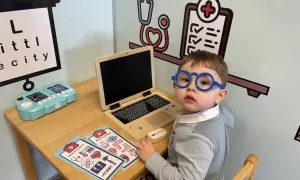Artificial Intelligence (AI) is transforming prenatal care by significantly improving the early detection of congenital heart defects (CHDs), according to a groundbreaking study. Research presented at the Society for Maternal-Fetal Medicine meeting in Denver highlights how AI-assisted analysis of prenatal ultrasounds surpasses doctors in both speed and accuracy, offering new hope for better neonatal outcomes.
AI vs. Doctors: A Game-Changer in Prenatal Heart Defect Detection
The study demonstrated that AI-powered software greatly enhances the ability of obstetricians and maternal-fetal medicine specialists to identify CHDs in prenatal ultrasounds. Lead researcher Dr. Jennifer Lam-Rachlin emphasized that AI not only improves accuracy but also boosts doctors’ confidence in diagnosing these life-threatening conditions.
The Impact on Neonatal Health
Congenital heart defects affect approximately 1 in 4 newborns, with many requiring urgent surgery or specialized care within the first year of life. While prenatal ultrasounds serve as a crucial early warning system, many scans are reviewed by non-specialists, leading to misdiagnoses. AI is poised to bridge this gap, providing a more reliable and efficient diagnostic tool for healthcare professionals.
Study Findings: AI Enhances Accuracy and Reduces Diagnostic Time
For this study, 14 OB-GYNs and maternal-fetal medicine specialists analyzed 200 prenatal ultrasounds from 11 hospitals across two countries. The research showed that AI-assisted evaluations significantly increased detection rates for congenital heart defects. Additionally, doctors using AI completed their assessments more quickly, making the diagnostic process faster and more efficient.
Bridging the Gap in Medical Expertise
Dr. Lam-Rachlin pointed out that at least half of prenatal ultrasounds in the United States are examined by non-specialist medical professionals, including OB-GYNs who may lack specialized training in ultrasound interpretation. This knowledge gap contributes to low detection rates of congenital heart defects, even in advanced healthcare systems.
By integrating AI into prenatal screenings, healthcare providers can ensure more accurate, faster, and life-saving diagnoses. The study’s findings suggest a paradigm shift in how congenital heart defects are detected and managed, paving the way for improved neonatal care worldwide.
#AIHealthcare #PrenatalCare #CongenitalHeartDefects #MedicalInnovation #HealthTech #ArtificialIntelligence #FetalMedicine #HeartHealth




+ There are no comments
Add yours